Imperial hosts inaugural World Patient Safety Day event

Dan Weill
Imperial College London unites global leaders in patient safety for the first ever World Patient Safety Day conference.
Hosted by the College’s Institute of Global Health Innovation (IGHI) and in collaboration with the Department of Health and Social Care and the World Health Organization, the inaugural event aims to galvanise thought-leaders, policy-makers and the public to take urgently-needed steps to improve the safety of care for all.
Speakers include Dr Aidan Fowler, National Director of Patient Safety, Jeremy Hunt, former health secretary, and Nadine Dorries, MP – Parliamentary Under-Secretary of State for Mental Health, Suicide Prevention and Patient Safety, who together make the case for a global commitment to patient safety and strengthened action on delivering safe, high-quality care worldwide.
The event forms part a growing movement to prioritise patient safety on the global health agenda as the impacts of unsafe care are becoming more prominently realised. Unsafe care accounts for more lives lost globally than lung cancer, placing it among the top 10 causes of death across the world. Alongside the devastating consequences to patients and their families, the cost of unsafe care to health systems is in the trillions globally.
These figures are highlighted in a new IGHI-led report on the state of patient safety worldwide, released at the event today (Tuesday), which calls for global collaboration to improve the safety and quality of healthcare. The report also lays out a number of evidence-based strategies which, if successfully implemented, would drive forward safer systems and care.
These focus on the widespread adoption of standardised tools and guidelines like the WHO Safe Surgery Checklist, education and training of patient safety leaders, greater research efforts and international collaboration.
“That patients are being harmed as a direct result of care is one of the greatest failings of health systems today, and the notion that these are unavoidable consequences is unacceptable and needs to change,” said Professor Ara Darzi, IGHI Co-Director and one of the report’s authors.
“Through this event and our report, we want to provoke urgent and necessary action to drive forward safer and better quality care. There is no single silver bullet, and it is only by working together that we can overcome the pervasive barriers we currently face to providing safe care – a basic right for every patient.”
Poised for progress
The WHO’s establishment of World Patient Safety Day on 17th September, announced earlier this year, is the welcome culmination of years of effort to raise the global profile of patient safety. IGHI and its NIHR Imperial Patient Safety Translational Research Centre (PSTRC) has played a key role in this continued journey.
The Centre and its leaders have helped to build critical momentum and awareness through convening the Global Ministerial Summits for Patient Safety in collaboration with the WHO, and by pushing forward a focused research and education agenda. The PSTRC is now recognised as the leading patient safety research centre in the UK and has been chosen as a partner for the WHO’s Global Patient Safety Collaborative. This initiative, which has the potential to improve the care safety of 1.5 billion people across the world, aims to accelerate progress in patient safety through innovative programmes of education and research, focussing on low- and middle-income countries.
“Progress in the research world is too often reserved for academic journals and absent from policy dialogue and local action planning,” said Dr Kelsey Flott, Policy Fellow and the Patient Safety Lead, IGHI, Imperial College London.
“But with advances that are now enabling us to better understand safety issues and respond to them appropriately and effectively, we have a unique opportunity to significantly reduce harm and improve the lives of millions of patients across the world and their families. Now is the time for ambitious visions and bold action, which we hope our report and event will stimulate.”
Article text (excluding photos or graphics) © Imperial College London.
Photos and graphics subject to third party copyright used with permission or © Imperial College London.
Reporter
Justine Alford
Institute of Global Health Innovation